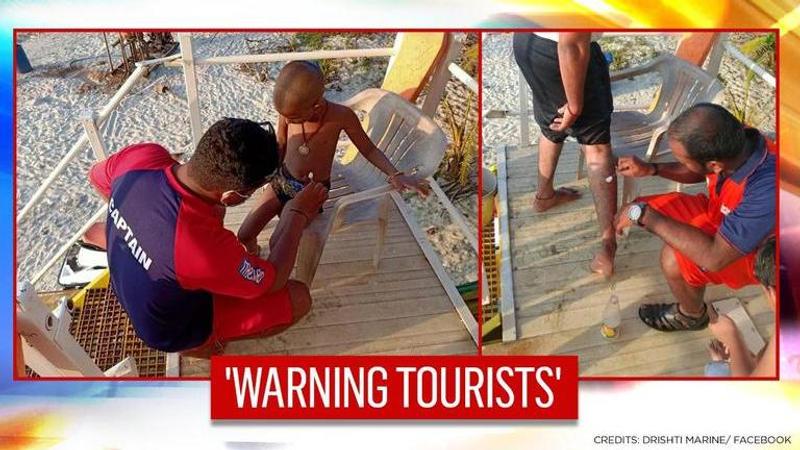Published 14:37 IST, November 20th 2020
'Floating terror': Jellyfish swarms sting 90 bathers in 2 days on Goa beaches
"We are making announcements and warning tourists,” the lifesaver agency wrote, sharing photos of first aid workers treating people stung by Jellyfish.

As many as 90 tourists in Goa were administered first aid, while a few developed serious health implications such as breathlessness and chest distress after they were bitten by Bluebottle jellyfish also known as Portuguese man-of-war. Scores of these fishes called the “floating terrors” due to its poisonous sting, washed ashore in North Goa on the beaches from Baga to Calangute. The marine creatures injured several over two days as they infested the seawater in large numbers. Safety and Rescue Service in Goa, Drishti, shared the images of the rescue operation, as first-aid workers were seen treating people who felt victim to the Jellyfish attack.
“Please be careful in the water. This variety is not toxic but can cause a reaction if stung. Lifesavers have vinegar and cotton to help alleviate the pain,” the agency wrote in a post. It added, that the Lifesaver sector head was sounding warnings due to an onslaught of tourists unaware of the lurking danger. "In North, Baga to Calangute today we recorded 50 guests, Candolim to Sinquerim stretch 10 guests. In South 19 people. Crowd density has increased. We are making announcements and warning tourists,” the agency wrote. In the photos shared by the lifesaver agency, people were seen stung by the venomous marine creature and were being treated profusely. Furthermore, Goa State Tourism Department was notified of the deadly cluster’s presence in the sea, as authorities then issued a warning to the bathers to stay at a safer distance.
[Drishti lifeguards spotted these dangerous sea creatures on Baga beach. Credit: Drishti Lifesaver press release]
In an official press release, Drishti's lifesaver agency informed that the Jellyfish were basically two types, one that was extremely toxic and separately a nontoxic category. “Most are harmless to humans,” it said. However, Bluebottle jellyfish which comes in the extremely toxic category and are less than an inch in size can prove to be venomous, the agency informed. While a non-toxic jellyfish’s sting only caused a mild irritation, Bluebottle jellyfish’s sting is “extremely dangerous”, the agency warned, adding, even when the marine creature was dead. The agency also issued an advisory on immediate actions to take when stung by these “floating terrors”.
[The Portuguese Man-of-War or Bluebottle jellyfish that have been spotted on Baga beach. Credit: Drishti Lifesaver press release]
Recommended action when stung by Bluebottle jellyfish:
- Immediately clean the stung area with hot water as the heat will break down the toxins.
- Spray the stung area with vinegar or dip vinegar in cotton and apply. “It is known to diffuse any poison that may be more active in the nematocysts present in the tentacles,” according to Drishti.
- Apple the ice packs on the stung area. This will reduce the pain to some extent and provide relief.
- In case of chest distress and breathing difficulty, call emergency, and seek medical help.
Updated 14:35 IST, November 20th 2020






